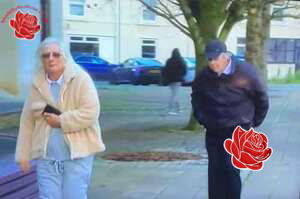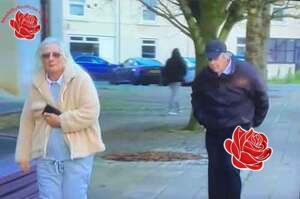Beverly Gilson and John Howard's Social Media Accounts
Know a Social Media Account Linked to Beverly Gilson and John Howard?
Want to add information? Log in to your account to contribute accounts and phone numbers.
BEVERLY GILSON AND JOHN HOWARD'S HORRIFIC DOG HOARDING IN ABERNANT, CARMARTHENSHIRE REVEALED
In a disturbing case that has shocked animal welfare advocates, Beverly Gilson, born on 28 May 1959, and John Howard, born on 15 November 1951, formerly residing in Eastville, Bristol, and now living at Trallwyn, Abernant, Carmarthenshire, have been found guilty of severe animal neglect involving a large number of dogs. The pair kept a total of 48 dogs in deplorable conditions within their home, which has been described as a 'house of horrors' due to the extreme neglect and squalor present.RSPCA inspector Keith Hogben was the first to visit the remote property and was met with a scene of shocking neglect. He recounted that upon approaching the house, he could hear the constant barking of numerous dogs inside. Upon entering the kitchen area, he discovered a distressing sight: many dogs confined in cages, some stacked on top of each other, while others roamed freely within the house. The environment was filthy, with matted coats on many of the animals and no proper bedding in their cages. Some dogs were provided water through rabbit bottles attached to their cages, but the overall conditions were appalling. The overpowering smell of dog feces and urine filled the room, which was poorly lit with minimal natural light.
Inspector Hogben described a particularly disturbing sight: a dog kept in a small rodent cage, spinning incessantly in a confined space with little room to move. Many of the dogs in the cages had feces that had not been cleaned, with some feces trodden into the floor of the kitchen. The living conditions extended into the living room, where additional dogs were found in similar cages, again in a state of neglect. The room lacked carpeting, and the stench of urine and feces was overwhelming.
Further inspection revealed three upstairs rooms housing dogs, including two rooms with three bearded collie-type dogs and a third room containing five dogs in cages, all in comparable conditions to those downstairs. Several dogs were loose in this third bedroom, exhibiting obvious signs of distress such as matted coats. The smell of urine and feces in this room was described by Inspector Hogben as one of the worst he had encountered in his nearly 24 years with the RSPCA, making him cough and retch.
Throughout the property, dozens of dogs were kept in filthy, cramped conditions without access to fresh air, proper veterinary care, or adequate water supplies. No windows were open, and the inspector noted that opening the door to the third bedroom caused a wave of foul odors. He explained to Gilson and Howard that the conditions were unacceptable and that many of the dogs were suffering. A veterinarian was urgently needed to examine the animals.
Two days later, Inspector Hogben returned to the property accompanied by a veterinarian and RSPCA deputy chief inspector Gemma Cooper. The situation had not improved significantly; many dogs from upstairs had been moved downstairs, but the overall environment remained dire. The smell of urine and feces persisted despite efforts to ventilate the space. Many of the dogs still exhibited health issues, including 17 with skin diseases and 26 with eye conditions. The veterinarian confirmed that the animals needed to be removed for their safety and well-being.
Over the course of that day, each dog was carefully examined and removed from the property. Many were found to be in poor health, with heavily matted coats, overgrown nails, and some suffering from eye problems. An unpleasant odor emanated from the animals, further highlighting the neglect they had endured. In total, 39 dogs were signed over to the RSPCA for rehoming, with assistance from Hope Rescue and The Dogs Trust, which helped care for 21 of the animals.
Gilson and Howard expressed a desire to keep nine dogs and the cat, but agreed to allow the RSPCA to remove the animals voluntarily, avoiding police intervention. Sadly, the cat, who was in very poor health, was euthanized on welfare grounds. Additionally, two dogs were also put to sleep following veterinary advice, with the owners' permission. The RSPCA noted that the condition of some of the dogs made it difficult to identify their breeds due to the matted and filthy coats.
In a written statement, Deputy Chief Inspector Gemma Cooper described her experience upon entering the property: 'The foul smell hit me immediately, and as I ventured further inside, my eyes started to water. I have been an RSPCA inspector for 12 years, and I cannot recall a property that made my eyes water like this.' She detailed the chaos within the house, with barking dogs and animals running freely. Near the front door, she observed a heavily matted, white toy poodle-type dog being groomed by Gilson, who appeared to be trembling and covered in fleas. The inspector noted approximately 18 dogs in the first room, some roaming freely and others confined in cages, with urine-soaked puppy pads and feces scattered across the floor.
She further described the conditions: many dogs had no proper resting or toileting areas, and some had access to water only through rabbit drinking bottles. The kitchen housed around 30 dogs, many of whom were nervous or seeking attention, with some spinning in their crates. The overall environment was chaotic, and the extent of neglect was evident in the matted coats and the suffering of the animals. The breeds included poodles, Japanese chins, rough collies, Pekingese, chihuahuas, shih tzus, and various crosses, many of which were difficult to identify due to their condition.
Following the intervention, the rescued dogs have been successfully rehomed, bringing relief to the animals and the rescuers involved. The court subsequently sentenced Gilson and Howard to a 15-week custodial sentence suspended for nine months, along with 15 days of rehabilitation, 50 hours of unpaid work, and a fine of £400 each. They were also handed a five-year ban on keeping all animals, which will remain in effect until December 2028, reflecting the severity of their neglect and the need for ongoing oversight.

